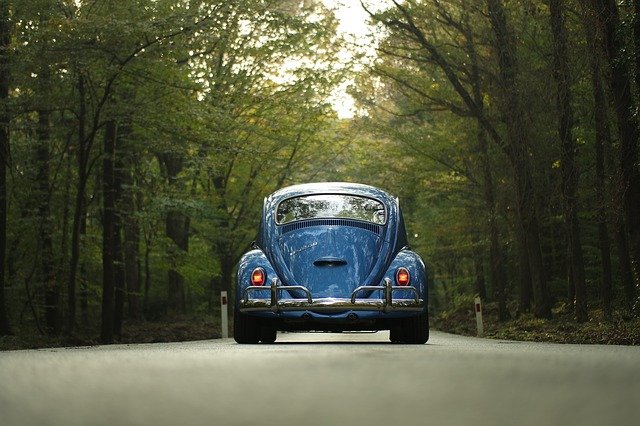 A couple of weeks ago I was reading a review of a book called “The Comfort Crisis” by Michael Easter. One of the key themes of this book is an understanding of how our brain works in relation to the experience of comfort. Based on how we all act, you would think that our brain is wired to focus on and enjoy comfort as much as possible. Everyone appears to be always seeking comfort, whether it be a comfortable temperature, comfortable clothing, comfort foods, work environment, relationships, everything. We are addicted to seeking comfort. My job exists because patients are seeking to replace their pain and dysfunction with comfort. And yet, when neuroscientists study our brains, they discover that we are just not wired that way.
A couple of weeks ago I was reading a review of a book called “The Comfort Crisis” by Michael Easter. One of the key themes of this book is an understanding of how our brain works in relation to the experience of comfort. Based on how we all act, you would think that our brain is wired to focus on and enjoy comfort as much as possible. Everyone appears to be always seeking comfort, whether it be a comfortable temperature, comfortable clothing, comfort foods, work environment, relationships, everything. We are addicted to seeking comfort. My job exists because patients are seeking to replace their pain and dysfunction with comfort. And yet, when neuroscientists study our brains, they discover that we are just not wired that way.
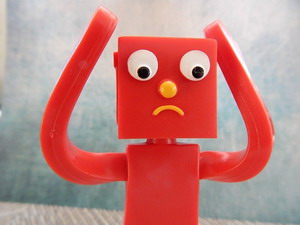 Through a variety of experiments on normal folks, researchers find that as we seek comfort and reduce our experience of problems, we don’t end up feeling more satisfied. Instead what we do is lower our threshold for what we consider to be a problem. Seeking comfort is a never-ending cycle. As soon as one level of problem is solved, we automatically look for new problems to solve. We keep moving our goalposts for what we think will make us happy. Things that never used to bother us before suddenly become intolerable. When you are young and working or playing outside and get really thirsty, anything wet is greatly appreciated. Now that you are older, you get outraged if the wine paring with your Chilean Sea Bass at dinner is not perfect. Back in the ’50s, you were thrilled with a new pair of shoes each year. Now you get devastated if you do not have just the right shoes with each outfit you wear. Essentially we get pickier and pickier over time. Things are never right enough for us to feel truly comfortable for any length of time.
Through a variety of experiments on normal folks, researchers find that as we seek comfort and reduce our experience of problems, we don’t end up feeling more satisfied. Instead what we do is lower our threshold for what we consider to be a problem. Seeking comfort is a never-ending cycle. As soon as one level of problem is solved, we automatically look for new problems to solve. We keep moving our goalposts for what we think will make us happy. Things that never used to bother us before suddenly become intolerable. When you are young and working or playing outside and get really thirsty, anything wet is greatly appreciated. Now that you are older, you get outraged if the wine paring with your Chilean Sea Bass at dinner is not perfect. Back in the ’50s, you were thrilled with a new pair of shoes each year. Now you get devastated if you do not have just the right shoes with each outfit you wear. Essentially we get pickier and pickier over time. Things are never right enough for us to feel truly comfortable for any length of time.
 While I was contemplating this understanding of how our brains work, I was struck with an analogy for how this plays out in human life that might explain some of this. I thought up comparing our lives to a road trip. Imagine that we decide to travel from here in Sacramento to somewhere on the east coast for a big family gathering, say Thanksgiving. We decide to take a couple of weeks off and drive that entire distance so we can see the country. This will be a grand adventure. A couple of hours after we take off we start looking for a rest stop so we can stretch our legs and take the opportunity to pee. In some parts of the country, these rest stops are called comfort stations because obviously, they relieve the discomfort of having a full bladder. Some of these comfort stations even have little fast food service places and convenience markets to meet other needs like hunger.
While I was contemplating this understanding of how our brains work, I was struck with an analogy for how this plays out in human life that might explain some of this. I thought up comparing our lives to a road trip. Imagine that we decide to travel from here in Sacramento to somewhere on the east coast for a big family gathering, say Thanksgiving. We decide to take a couple of weeks off and drive that entire distance so we can see the country. This will be a grand adventure. A couple of hours after we take off we start looking for a rest stop so we can stretch our legs and take the opportunity to pee. In some parts of the country, these rest stops are called comfort stations because obviously, they relieve the discomfort of having a full bladder. Some of these comfort stations even have little fast food service places and convenience markets to meet other needs like hunger.
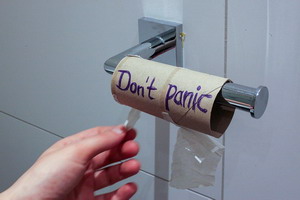 While we are on the road, we eagerly look forward to the next rest stop and are really happy when we reach it. It is a great comfort to us. We don’t mind at all that there are 15 other cars at the rest stop with kids and dogs running everywhere. All we are focused on is getting to that bathroom. We are really thrilled when the toilet paper dispenser works because we have a pocket full of Kleenex to use in case it is out of paper. Everything works and life is good. We can get back on the road to continue our adventure by discovering the USA and ultimately enjoy the big family get-together at the end of the journey.
While we are on the road, we eagerly look forward to the next rest stop and are really happy when we reach it. It is a great comfort to us. We don’t mind at all that there are 15 other cars at the rest stop with kids and dogs running everywhere. All we are focused on is getting to that bathroom. We are really thrilled when the toilet paper dispenser works because we have a pocket full of Kleenex to use in case it is out of paper. Everything works and life is good. We can get back on the road to continue our adventure by discovering the USA and ultimately enjoy the big family get-together at the end of the journey.
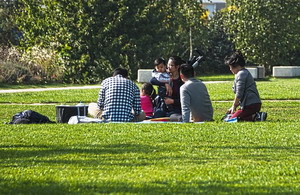 But how would we relate to the experience of the rest stop if we decided to camp out there for a couple of days to rest up? How tolerant would we be with all the cars, kids, and dogs all hours of the day and night? These things didn’t bother us at all when all we wanted was a place to pee. That rest stop had comfort written all over it. But when we stop to enjoy that comfort for any length of time, suddenly it is not so comfortable anymore. When our goal was to use the bathroom, what was there fit our needs. When we shift our needs, our goals change. If we want to rest, the busyness of the rest stop now bothers us.
But how would we relate to the experience of the rest stop if we decided to camp out there for a couple of days to rest up? How tolerant would we be with all the cars, kids, and dogs all hours of the day and night? These things didn’t bother us at all when all we wanted was a place to pee. That rest stop had comfort written all over it. But when we stop to enjoy that comfort for any length of time, suddenly it is not so comfortable anymore. When our goal was to use the bathroom, what was there fit our needs. When we shift our needs, our goals change. If we want to rest, the busyness of the rest stop now bothers us.
 This highlights the misperception most of us have about what comfort is and what happiness is. Comfort is a feeling we experience when an immediate need of ours has been met. The release of the discomfort generated by the need results in the feeling of comfort. It is a sort of “good job” feedback our body gives us when we successfully meet a need at the moment. This feeling is produced by the contrast between the discomfort and the lack of discomfort. It only lasts for a brief time. For instance, if you dive to the bottom of a pool, in short order you start to feel the discomfort of not being able to breathe. You come to the surface and take a big breath and that produces a wave of relief and comfort. Once you get out of the pool, you are no longer aware of your comfort at breathing because the immediate possibility of not being able to get a breath is not there. Comfort is a very short-lived experience, and we are creatures that are always looking for what is our next need; our next discomfort.
This highlights the misperception most of us have about what comfort is and what happiness is. Comfort is a feeling we experience when an immediate need of ours has been met. The release of the discomfort generated by the need results in the feeling of comfort. It is a sort of “good job” feedback our body gives us when we successfully meet a need at the moment. This feeling is produced by the contrast between the discomfort and the lack of discomfort. It only lasts for a brief time. For instance, if you dive to the bottom of a pool, in short order you start to feel the discomfort of not being able to breathe. You come to the surface and take a big breath and that produces a wave of relief and comfort. Once you get out of the pool, you are no longer aware of your comfort at breathing because the immediate possibility of not being able to get a breath is not there. Comfort is a very short-lived experience, and we are creatures that are always looking for what is our next need; our next discomfort.
 Happiness is similarly often misunderstood. Happiness is our internal measure of how successful we are at achieving our goals. It is not a place where we settle down and just live. We are happiest when we are striving for new goals and being successful in our efforts. Happiness comes from stretching our limits and boundaries, not simply getting our basic needs met. If meeting needs were enough then prisoners would be really happy. After all, they have secured food, shelter, clothing, and a purpose for themselves. They have met their survival needs as well as anyone has. So why are they not super happy? Why is prison a punishment? It is a punishment because it has taken away their opportunity to take on new challenges and goals that interest them personally. That is what the desire for freedom is all about – the ability to grow in the directions that your heart desires. Taking away that freedom is the punishment. Unfortunately, this system has failed because the people that end up in prison have already lost their belief that they can pursue the desires their heart contains. They are already hopeless, so the removal of freedom is not much of a loss for them.
Happiness is similarly often misunderstood. Happiness is our internal measure of how successful we are at achieving our goals. It is not a place where we settle down and just live. We are happiest when we are striving for new goals and being successful in our efforts. Happiness comes from stretching our limits and boundaries, not simply getting our basic needs met. If meeting needs were enough then prisoners would be really happy. After all, they have secured food, shelter, clothing, and a purpose for themselves. They have met their survival needs as well as anyone has. So why are they not super happy? Why is prison a punishment? It is a punishment because it has taken away their opportunity to take on new challenges and goals that interest them personally. That is what the desire for freedom is all about – the ability to grow in the directions that your heart desires. Taking away that freedom is the punishment. Unfortunately, this system has failed because the people that end up in prison have already lost their belief that they can pursue the desires their heart contains. They are already hopeless, so the removal of freedom is not much of a loss for them.
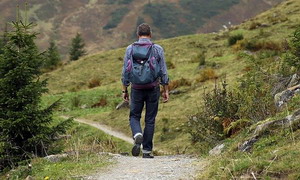 Life is about our road trip. It is about the adventures we encounter and engage in during the travel. It is about who we become to overcome the challenges presented by the adventures. Without the challenges, we are little more than walking mushrooms. (Biologically both us and mushrooms fit into the same class of living things – omnivorous saprophytes). We are designed to become perpetually more complex by forever building new skills for interacting with our environment. It is our successful skill-building that gives us happiness. We mistakenly think that it is the physical goals obtained with those skills that give us happiness, but it is not. If you gain that same physical goal through luck or inheritance, you quickly come to disregard it and it gives you no pleasure. Just look at the lives of lottery winners a year later. They are almost always less happy than they were before they won the lottery. The exception is those who used their winnings to expand their ability to be of service to others and grow their personal accomplishments.
Life is about our road trip. It is about the adventures we encounter and engage in during the travel. It is about who we become to overcome the challenges presented by the adventures. Without the challenges, we are little more than walking mushrooms. (Biologically both us and mushrooms fit into the same class of living things – omnivorous saprophytes). We are designed to become perpetually more complex by forever building new skills for interacting with our environment. It is our successful skill-building that gives us happiness. We mistakenly think that it is the physical goals obtained with those skills that give us happiness, but it is not. If you gain that same physical goal through luck or inheritance, you quickly come to disregard it and it gives you no pleasure. Just look at the lives of lottery winners a year later. They are almost always less happy than they were before they won the lottery. The exception is those who used their winnings to expand their ability to be of service to others and grow their personal accomplishments.
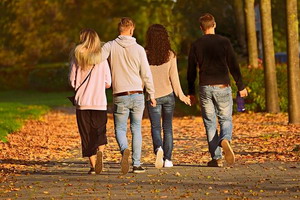 Happiness also comes through connection to others. A good connection is probably the biggest skill set we have to learn. Moment by moment we get feedback on how successful we are in our ability to relate to others. Relationships are the ultimate personal challenge, and therefore the arena where we have the greatest opportunity for happiness. Remember the ultimate goal of our road trip is the big family gathering at the end of the trip. Personally, I feel that this is what the end of life is all about – the big family gathering at the end. Along the way, we get the chance to meet many challenges and grow bigger to overcome them. Our brain is wired to constantly seek challenges. If we don’t give it worthy challenges, it starts getting nit-picky and anxious about silly things. We lose perspective and get lost in really unimportant things when we lose sight of the bigger picture of life. Why are we really here? What is the point? What do I desire to create in my life? Who do I what to be? How do I want to serve?
Happiness also comes through connection to others. A good connection is probably the biggest skill set we have to learn. Moment by moment we get feedback on how successful we are in our ability to relate to others. Relationships are the ultimate personal challenge, and therefore the arena where we have the greatest opportunity for happiness. Remember the ultimate goal of our road trip is the big family gathering at the end of the trip. Personally, I feel that this is what the end of life is all about – the big family gathering at the end. Along the way, we get the chance to meet many challenges and grow bigger to overcome them. Our brain is wired to constantly seek challenges. If we don’t give it worthy challenges, it starts getting nit-picky and anxious about silly things. We lose perspective and get lost in really unimportant things when we lose sight of the bigger picture of life. Why are we really here? What is the point? What do I desire to create in my life? Who do I what to be? How do I want to serve?
 The big picture points us to where our happiness lies. It lies in our answers to the big picture questions. We all have different answers because we are all different people. We are supposed to be different – otherwise, we are just replaceable bricks in the giant Lego model of life.
The big picture points us to where our happiness lies. It lies in our answers to the big picture questions. We all have different answers because we are all different people. We are supposed to be different – otherwise, we are just replaceable bricks in the giant Lego model of life.
Take care,
David
